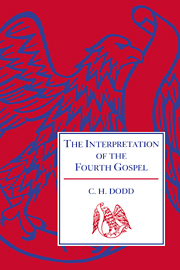Book contents
- Frontmatter
- Contents
- PART I THE BACKGROUND
- 1 The setting in early Christianity
- 2 The higher religion of Hellenism: the Hermetic literature
- 3 Hellenistic Judaism: Philo of Alexandria
- 4 Rabbinic Judaism
- 5 Gnosticism
- 6 Mandaism
- PART II LEADING IDEAS
- PART III ARGUMENT AND STRUCTURE
- APPENDIX: Some considerations upon the historical aspect of the Fourth Gospel
- Index Locorum
- Index Nominum
6 - Mandaism
from PART I - THE BACKGROUND
Published online by Cambridge University Press: 10 December 2009
- Frontmatter
- Contents
- PART I THE BACKGROUND
- 1 The setting in early Christianity
- 2 The higher religion of Hellenism: the Hermetic literature
- 3 Hellenistic Judaism: Philo of Alexandria
- 4 Rabbinic Judaism
- 5 Gnosticism
- 6 Mandaism
- PART II LEADING IDEAS
- PART III ARGUMENT AND STRUCTURE
- APPENDIX: Some considerations upon the historical aspect of the Fourth Gospel
- Index Locorum
- Index Nominum
Summary
The Mandaean religion is practised at the present day by a small community resident in Iraq. Their cultus and beliefs were made known to Europeans by travellers in the East, but are now more accurately known through the publication of their sacred writings, which are written in a dialect of Aramaic. The chief of these are the Ginza (‘Treasure’) and the Book of John, both being collections of tractates originally more or less independent, along with liturgical texts. None of the MSS. of the Ginza or the Book of John are older than the sixteenth century. The collection however is undoubtedly much older than this, dating probably from the early Islamic period, when the Mandaeans desired to be recognized by their conquerors, along with Jews and Christians, as ‘people of the Book’. The compilation of the Mandaean Canon, therefore, cannot be dated much, if at all, before A.D. 700. That is not to say that certain of the writings contained in it may not be earlier, though considerable portions of the Ginza and of the Book of John were certainly written after the appearance of Islam, since they contain references to Mohammed and to the spread of his religion. The earliest allusion to the sect in literature is found in Theodore bar Khonai (A.D. 792). For any history of the Mandaeans and their beliefs before 700 we are dependent solely on inference and speculation.
- Type
- Chapter
- Information
- The Interpretation of the Fourth Gospel , pp. 115 - 130Publisher: Cambridge University PressPrint publication year: 1953
- 2
- Cited by



